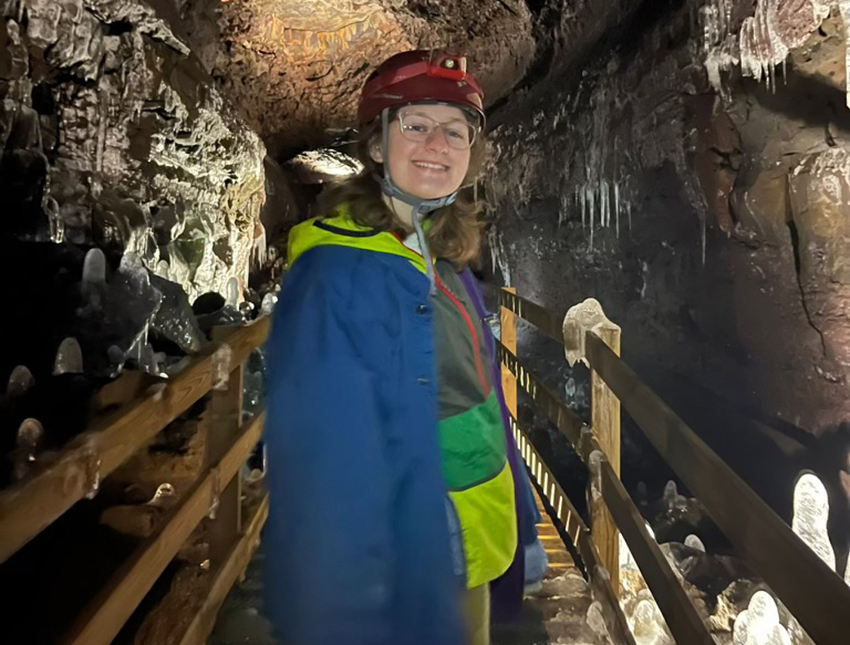Stephanie Menten awarded Zonta International Amelia Earhart Fellowship
07-01-2024

Stephanie Menten’s research takes her into the depths of the Earth so that she can study distant moons and planets. During a recent trip, she explored a lava tube in Iceland. Photo provided by Stephanie Menten.
During a recent trip to Iceland, Stephanie Menten received an email announcing that she is one of only 30 scientists worldwide receiving a 2024 Zonta International Amelia Earhart Fellowship. Menten, a PhD Student with Purdue University’s Department of Earth, Atmospheric, and Planetary Sciences (EAPS), studies the geophysics of icy moons in our outer solar system. Particularly, she studies processes such as cryovolcanism, volatile transport, and internal convection.
“I'm super excited and honored to receive this award,” says Menten. “This award is specifically for women pursuing higher education in space sciences to provide support and try to raise the ratio of women to men in the space science industry (currently 25% women and 75% men). This award will provide me important support in attending conferences and funding research supplies during my PhD.”
Zonta International is a leading global organization of individuals working together to build a better world for women and girls. The Amelia Earhart Fellowship was established in 1938 in honor of famed pilot and Zontian, Amelia Earhart. The $10,000 Fellowship is awarded annually to up to 30 women pursuing Ph.D./doctoral degrees in aerospace engineering and space sciences. Since the program’s inception in 1938, Zonta has awarded 1,734 Amelia Earhart Fellowships, totaling more than $11.6 million, to 1,305 women from 77 countries. The list of 2024 fellowships includes two Purdue University students, Menten and Margaret Deahn, both from the EAPS department with the Purdue University College of Science.
Menten is originally from Kernersville, North Carolina and received a Bachelor of Science degree in Geology from North Carolina State University in 2020.
“I grew up being really interested in space, science, and the outdoors. My parents always instilled in me a respect for nature and the Earth, and my dad and I used to go outside and look for comets and watch meteor showers together as a kid,” she says. “When it came time for choosing a college major, I chose geology because I wanted to know more about why our landscapes look the way they do, and I was also really interested in volcanism. During my college studies, I discovered planetary volcanism and cryovolcanism, and I knew that I wanted to study these processes during my graduate degree to combine my love of geology and space. I think planetary science is such a fascinating field! The planets and moons in our solar system are the only other planetary bodies that we will ever visit by spacecraft (in my lifetime at least) and they provide us with an opportunity to learn about all of the strange processes that occur in not only our own solar system, but likely many others in the universe. There's still so much to learn about icy bodies, and I look forward to helping contribute to this learning.”
She is advised by Prof. Mike Sori. She says that students who would like to apply for this in the future can do so with a relatively easy application process.
“The application process was fairly simple! It requires a statement of purpose detailing your career goals and how they relate to space sciences, three letters of recommendation, and space to fill out your extracurriculars and publications,” she says. “I am super pumped to win it!”
In the upcoming school year, she and the other fellowship awardees will be hosted at a Zonta International ceremony where they will be presented with a certificate and a fellowship wings pin.
About the Department of Earth, Atmospheric, and Planetary Sciences at Purdue University
The Department of Earth, Atmospheric, and Planetary Sciences (EAPS) combines four of Purdue’s most interdisciplinary programs: Geology & Geophysics, Environmental Sciences, Atmospheric Sciences, and Planetary Sciences. EAPS conducts world-class research, educates undergraduate and graduate students, and provides our college, university, state and country with the information necessary to understand the world and universe around us. Our research is globally recognized, our students are highly valued by graduate schools, employers, and our alumni continue to make significant contributions in academia, industry, and federal and state government.
Contributors:
Stephanie Menten, PhD candidate with the Department of Earth, Atmospheric, and Planetary Sciences
Written by Cheryl Pierce, Communications Specialist